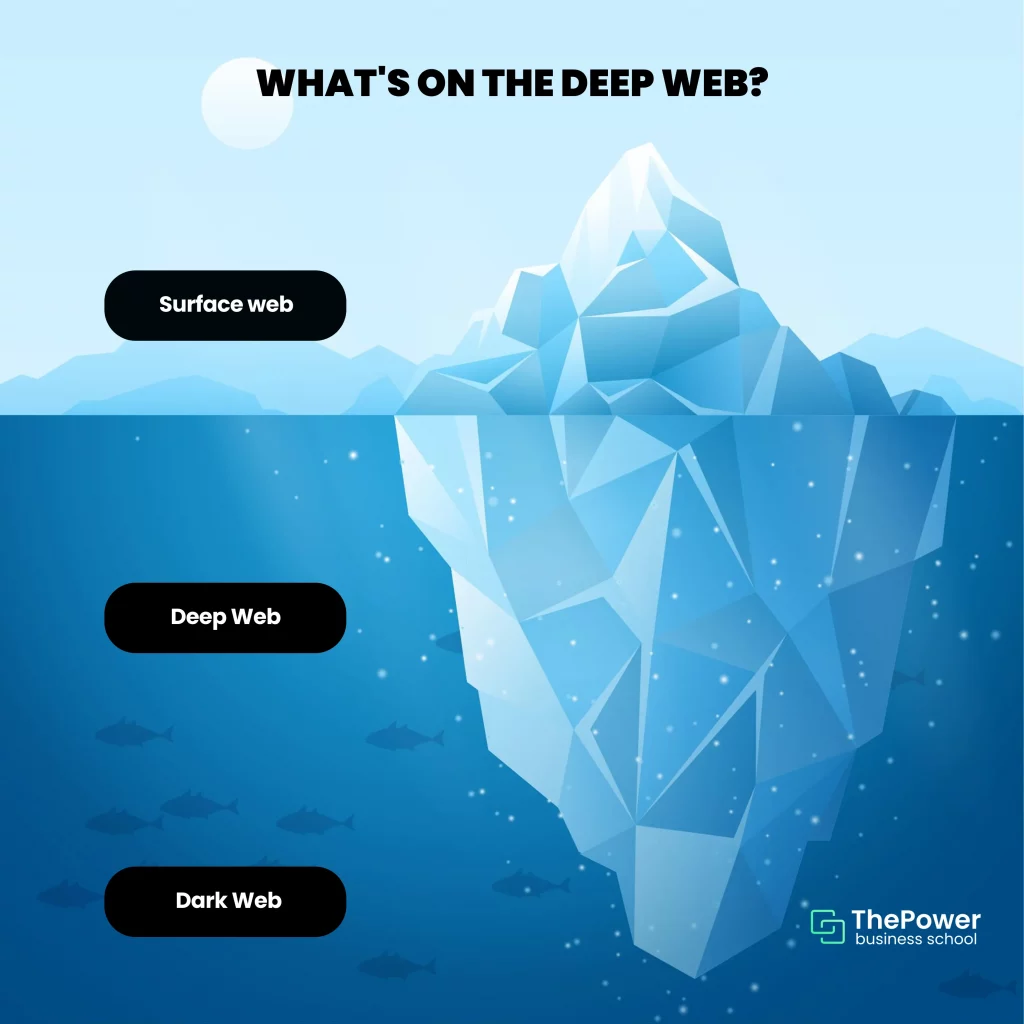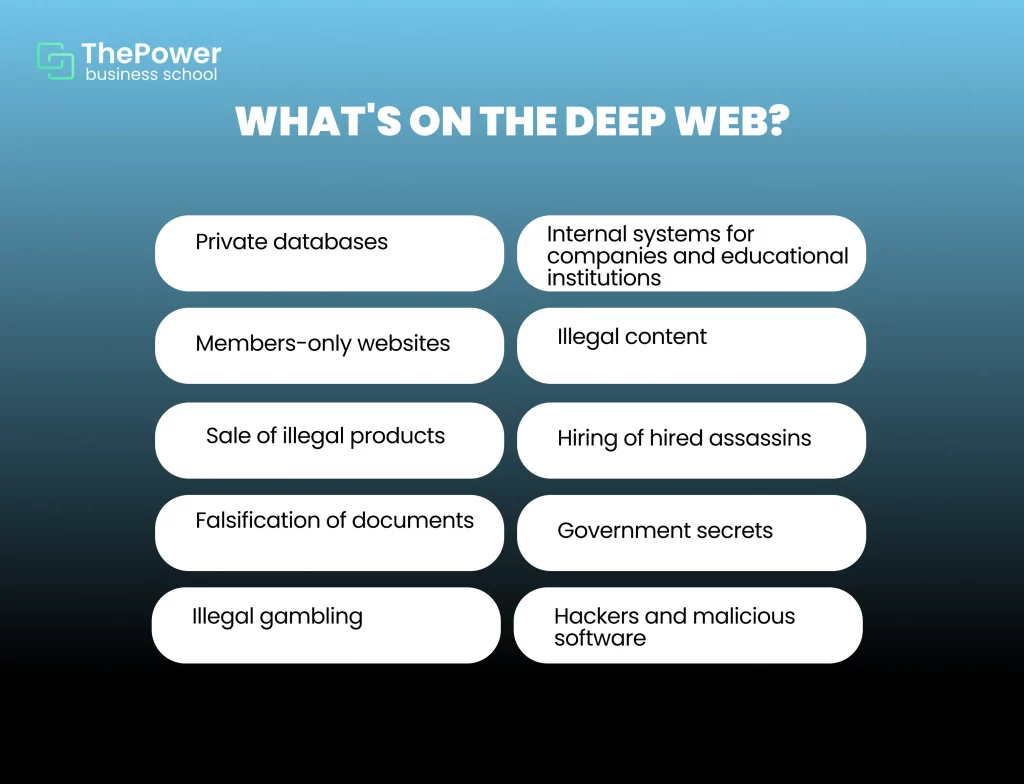
Franco Brutti
The Internet is bigger than you might think.
The sites that show up in search engines like Google are just 5% of everything you can find on the Internet (and boy, is that 5% vast).
All the websites that are not indexed in search engines are known as the Deep Web.
The Deep Web is a deep sea with some "good" stuff, but with many imminent dangers. It’s the place where all confidential, personal and business information is usually kept. But it's also the place where criminals commit all sorts of illicit acts.
If you have the itch and would like to know what the Deep Web is and what to find in it, continue reading this post.
So... What is the Deep Web?
The Deep Web refers to those websites that we cannot access through search engines or social networks. The key to understanding this concept lies in indexing.
Any website that is not indexed in Google or other search engines can be considered as part of the Deep Web. But especially those sites that intentionally do not want to be found by search engines and block their indexing in Google.
The concept of the Deep Web was born in 2001 by Michael Bergman. The concept is based on the fact that all users find and access websites through search engines like Google. And therefore, any site that cannot be found by search engines will not be visible to users.
The 3 levels of the web
To understand the concept of the Deep Web a little better, we need to understand the three levels of the web.
Normally, the web is compared to an Iceberg that is divided into three parts: Surface Web, Deep Web and Dark Web.

Let's look at each one in more detail:
1. Surface Web
The Surface Web is the superficial part of the web and is represented as the part of the Iceberg that sticks out of the sea and is visible to everyone.
In this part of the web, there are all the pages and data that can be found by search engines or through social networks. It constitutes only 5% of the web.
You can access these websites with traditional browsers such as Chrome, Firefox or Edge. Search engines can easily crawl them and place them in their rankings. Through keywords in the search engine, you will be able to find them.
We also count here those sites that can be found through social networks.
2. Deep web
Continuing with the illustration of the Iceberg, the Deep Web is the part that lies under the sea and constitutes almost the entire bulk or body of the web. In fact, the Deep Web represents 90% of the entire Internet.
In this area are all the websites that have not been indexed, private databases and even illicit content.
Normally, these websites are protected by security walls that prevent both search engines and users from accessing them. This means that the links are not visible to most people.
There is a part of the Deep Web that is "safe" because important user data is stored there:
Bank and financial accounts.
Messaging in social networks or e-mail accounts.
Databases.
Legal and confidential files.
However, the deeper we go into the Deep Web, the more dangers we find, especially because we are approaching the deepest part of the web, known as: Dark Web.
3. Dark Web
As we have just said, it’s the deepest and darkest part of the web. Here not only are websites not indexed, but traditional browsers cannot access them. It represents just 0.1% of the web.
This is where Tor websites are located, so you will need an anonymous browser to access this part of the web. That's because IP addresses are masked to traditional browsers.
The Dark Web is the most dangerous area of the Internet, used for illicit actions of all kinds:
Illegal Content.
Trafficking or trade of illicit goods.
Hackers and computer criminals.
What is in the Deep Web?
Being the largest bulk of the Internet, the Deep Web is full of all kinds of content and websites: both legal and illegal. Here is a list of all the good and bad that is on the Deep Web:
1. Private databases
The Deep Web hosts most of the databases of companies, brands and websites.
The reason why those databases are here is very obvious: the database is a company's most precious asset, so its access should be kept private and limited to people with permissions.
Remember that databases are the main target of unethical hackers. Therefore, it should be kept protected and guarded only for a specific group of people.
2. Internal systems for companies and educational institutions
The Deep Web is used by companies and organizations as well as schools and universities to provide and obtain information to their employees and communities.
In the case of companies, it can be used to manage projects, files and internal communication between members of the same company.
In the case of educational institutions, it can be educational content, test and evaluation results, etc.
3. Members-only websites
Very similar to the previous use, the Deep Web is used to give access to a certain community to exclusive content.
All those platforms that offer exclusive content for those who have made a payment are on the Deep Web. That is, it’s not possible to access them in a direct way through the link.
For example, if you had the link to some of our classes, you would not be able to access them unless you have the necessary credentials. Those classes are on the deep web and can only be accessed through the credentials.
4. Users' personal accounts on social networks and understanding financials
Bank accounts, social network accounts and, in general, any personal and sensitive user information is also often found on the Deep Web, as it is confidential information which only the user should have access to.
6. Illegal content
We start with the dark side of the Deep Web. In this section of the Internet we can find all kinds of illegal and quite disturbing content.
For example, child pornographic content and other illegal sexual acts (such as rape) can be found in this part of the web.
It’s also possible to find other disturbing content, such as human experiments that were carried out during World War II.
The first reason not to enter the Deep Web.
7. Sale of illegal products
This is also where the black market moves: buying and selling all kinds of illegal products:
Drugs.
Weapons.
Explosives.
Human trafficking.
Poisons.
In 2017, for example, the FBI and DEA dismantled two websites dedicated to the sale of drugs, weapons, child pornography and malicious software.
8. Hiring hitmen
The Deep Web is also a hiding place for hired killers hired to take out targets in exchange for a high fee. It's a pretty dangerous place: several people have tried to get smart by researching the services of these hitmen and have found themselves in serious trouble.
9. Forgery of documents
Here you can also find all kinds of forged documents:
Credit cards.
Passports.
ID cards and driver's licenses.
Fake lottery coupons.
Stolen accounts.
10. Government secrets
Have you ever wondered where many conspiracy theories and the files that often support these theories come from? That's right, you guessed it: from the Deep Web.
Many government secrets are found in this section of the web. For example, Michael Jackson's famous phone call before his death and "evidence" of Tupac's murder can be found here.
11. Illegal gambling
Many casinos use the Deep Web as a place for illegal gambling. It's a pretty big world in which a lot of money moves around. In fact, to avoid being traced Bitcoin is often used as a form of payment.
12. Hackers and malicious software
The Deep Web is the favorite environment for computer criminals. It’s here that you can find all kinds of malicious software as well as hackers willing to get paid in order to do the dirty work.
Scams and credit card theft are also very common on the Deep Web. In the absence of a proven and reliable security system, it’s very easy to obtain credit card data and sell it on the black market.

Is it illegal to enter the Deep Web?
Entering the Deep Web is not illegal. And you can do it through your browser by entering the website or IP address in the top bar.
Some websites are blocked for normal browsers, so you will need to use browsers like Tor's DuckDuckGo.
Not everything you find on the Deep Web is necessarily bad. In fact, you are often there when you log into your bank accounts or those streaming platforms you subscribe to.
However, the Deep Web is full of many dangers. And we recommend you not to access any website if you have not checked its security level first. Let's talk a little more about the dangers of the Deep Web.
Dangers of entering the Deep Web: think twice
The dark side of the Deep Web is a dangerous side, little Padawan: you should not try to enter it, or at least not without taking precautions and knowing the risks that exist in it. Pay attention to the risks that exist:
1. Downloading malicious software or malware
When surfing the Deep Web, you can easily download malicious software that can harm your devices or leak sensitive personal information.
It’s important to know that the only way to download malicious software is to click where you shouldn't: or download files of interest that contain malware.
These sites are specially designed for you to click on such links and introduce malware to your devices.
2. Exposing your personal data
You are also prone to expose your personal data. You can do this by simply registering or commenting on some kind of forum. Cybercriminals can use this information to steal or extort money.
Phishing attacks often use this type of data. For example, forging bank pages so that you enter your credentials and steal all your money.
Scams also fall into this category. There are hundreds of websites selling "legitimate" products. The criminals get paid, but never ship the product.
3. Being monitored by the government
Governments are constantly monitoring both the Deep and Dark Web for criminals. Surfing these sites means becoming a target for the government and a potential suspect.
Therefore, you can be linked to different criminal acts. Be careful.
Putting your integrity or that of others at risk
Having contact with criminals is never a good idea. Some people trying to delve into what's on the Deep Web have put themselves in danger.
Also, remember that if you use a shared device (such as a company's), you may put other colleagues at risk.
CAUTION when surfing the Deep Web
Not everything on the Deep Web is necessarily bad. However, it does have many dangers that you need to watch out for. Put curiosity aside and surf safe websites.
And if you decide to enter the Deep Web, first make sure that the site you are browsing does not pose any danger.
And that's it for this post. Leave in the comments what curiosities you know about the Deep Web. We'd love to read about it.
Oct 14, 2022








